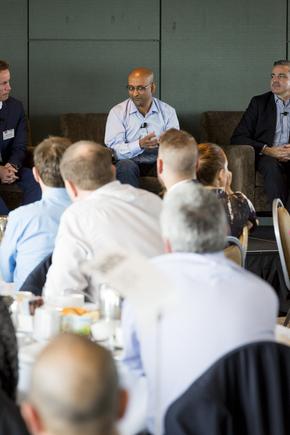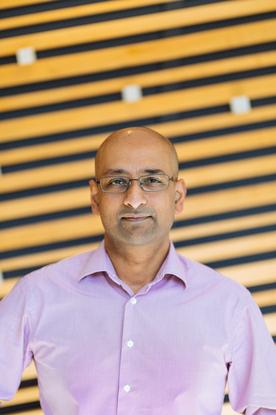CIO Outlook 2018: A broader view of leadership in the digital era
- 12 February, 2018 06:30
‘Make yourself redundant’
- Dhaya Sivakumar is executive vice president, Integration & Amadeus – Orion Health
“This goal is not just for 2018, it is an approach I’ve taken in my professional life that I have always tried to apply. Whenever I take on a role I always try and look at how to shape an organisation, recruit, promote and manage talent well and ultimately figure out how to let the organisation continue on its mission without me. A good leader should be able to leave his or her role and things should continue to work smoothly with the right kind of culture, processes and working environment persisting”.
Ideally you will be able to go into an organisation, understand its context, drive change where needed and then hand over the reigns with confidence when the time is right”.
Outside of my professional life I am becoming far more conscious of the wider community and respectful of the challenges faced by many. I believe there is a big role that technology leaders can play to get involved with and help less advantaged people who don’t have access to the same tools or opportunities that we may have had.
The ability to communicate and share experiences to let parts of the community know what is possible and what the world could look like is something we should all be conscious of and try to influence.
People can have different lenses on life depending on their circumstances and sharing our world can open up their eyes to more possibilities.

Making sure we are looking out for everybody while we go through the digital revolution is really important.
Living in a part of Auckland where there are less fortunate people, it is easy to see how my children are okay, familiar with technology and optimistic about the future and thinking broadly outside of their local environment. But it's very easy for me to contrast this with others of the same age who are often scared of technology, unfamiliar due to access and limited in their opportunities.
These kids will be left behind if we don’t help and from my perspective making sure we are looking out for everybody while we go through the digital revolution is really important.
There are similarities between some aspects of leadership in a professional context and through community work.
Part of any leader’s role is to paint a picture of what the future is going to look like and then articulate what it means for the organisation and our part in it.
For a business, it might be talking about how experiences or customers journeys will change and we need to think about how we enable customers in this new world.
Guiding people, letting go of job descriptions and really helping people see a broader view is all part of good leadership. In a community context, I have often observed people limiting their thinking based on their environment and have started to get involved to help people to think beyond. Often, we can be constrained in our thinking and limit our opportunities to our local market or things we are familiar with.
Everyone should know that they have the potential to do great things and have access to a global market and have the potential to make a difference in people’s lives.
We can do this through technology in NZ and we can offer a real alternative to selling milk and tourism as our primary export earners. We can paint this picture of what the future looks like to those that may not normally think of it and then we can help encourage and motivate people to be part of it.
This might sound complex but it starts with simple conversations and access to low cost technology."

'Help SMEs succeed in the digital economy'
- David Kennedy is chair of NZ TechLeaders and CIO of Transaction Services Group
"New Zealand has made some really good initiatives in the areas of digital and cyber. The focus now is on how we take those initiatives and set it down for the country.
The top tier, or the big organisations get it - the impact of digital transformation on their industries.
What we need focus on is the huge swathe of SMEs (small and medium enterprises), they make up 90 per cent of our businesses.
They have a different risk profile but we need to offer them help and guidance on how to manage the risks like cybersecurity.
My thoughts are that there should be a standard, like a WOF (warrant of fitness) for security. This could be a standard set of questions that you can give to SMEs and say, have you covered off these things?
How can we address the fact that SMEs have a lack of investment to be able to take advantage of a digital economy?
These can be simple things like, if you have lost your main computer, do you have a secondary computer? Do you have an effective backup? Do you have malware protection? Do you know what to do in the event of a suspected cyber attack?
And then, using the responses we could target information packs tailored for each SME to address their needs.
We also need a specific initiative to help the SMEs from a digital standpoint.
How can we define something, or have digital standards, that SMEs can use? How can they manage their digital experience? Do we know the questions we need to answer for these SMEs?
It will be like a Trade Me of products and services, to help SMEs manage their digital experience.
How can we address the fact that SMEs have a lack of investment to be able to take advantage of a digital economy?
What we don't want to happen is that external players come to our market using a digital channel and actually take away revenues from New Zealand businesses.
It could be a sector-led guidance. There can be one for each industry, like manufacturing or automotive, on how an SME with little free cash flow can take advantage of some of the digital channels. And, to educate them about these channels and the threats of digital disruption.
I want them to know the impact of digital disruption because this will directly impact the income of Kiwi families, many of whom are involved in these SMEs.
Taking this to our employees at Transaction Services Group, we have created a target operating model for all our companies.
It starts with helping people align themselves with a set of controls and initiatives that are summarised in a single page.
For instance, in the target operating model, we have a single operating framework for cyber and digital
We are going to continue to roll out the framework and education our staff on being security assets and enabling the digital transformation of our brands.
We have educated the senior leadership team on this focus and we have initiatives in place to ensure our largest cyber risks and digital threats are being managed. We have educated our executive to understand that digital disruption is where a third party enters a relationship that you have with a customer and provides them with value. This value is eroding your value proposition and is a threat to your relationship.
At TSG, we have reviewed our value net and have mitigated the chance of digital disruption through innovating our products and services.
If we can help them understand the threats and opportunities inside the company, they can take that up in their personal lives and help their family understand what those threats are and the opportunities for the future."

This is part two of our CIO Outlook 2018 report. Read part one on ‘securing results that matter’.
Related reading:
- Timothy Kasbe of The Warehouse Group takes a wide-angle lens on leadership
- Big data allows us to do ‘cool things’: Jennifer Cherrington-Mowat of Genesis Energy
- Government CIO Colin MacDonald on how NZ became a digital ‘standout’ nation
- Myles Ward of healthAlliance: A CEO’s perspective on investing for digital capability, innovation and change management
- Why Sarah Thirlwall of Counties Manukau Health is unfazed by the constant flux in the CIO role
Learn from your peers: Check out our State of the CIO report on the challenges and concerns of CIOs today. Sign up for CIO newsletters for regular updates on CIO news, career tips, views and events. Follow CIO New Zealand on Twitter:@cio_nz Join us on Facebook.
Send news tips and comments to divina_paredes@idg.co.nz
Follow Divina Paredes on Twitter: @divinap


